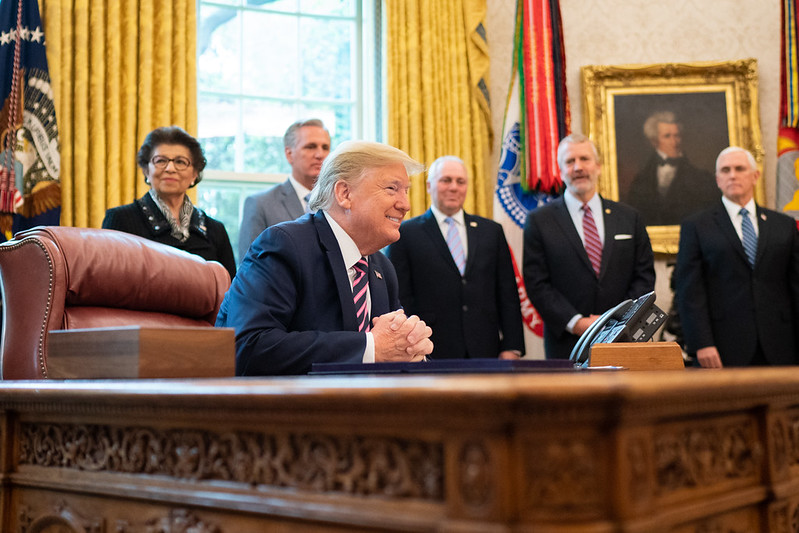Trump and the Personalization of the Congressional Spending Power
President Trump is the first president in history to donate his salary to government agencies. His quarterly gifts to various departments pose unique constitutional and statutory questions.

Published by The Lawfare Institute
in Cooperation With

As millions of Americans receive their coronavirus economic stimulus checks, they could be forgiven for assuming it was the president directly who paid them. After all, for the first time in history the federal government will disburse checks with the president’s name, “Donald J. Trump,” embossed on the memo line.
Trump’s action—what many critics have called a politicization of money appropriated by a separate branch of government—is not the first time that the president has personalized the cash flow in and out of government agencies. Most notably, he is also the first president in history to donate his salary to government agencies—unlike previous presidents who chose to donate their salaries, all of whom gave the money to charity. Trump has donated his salary every quarter. In March 2020, he provided it to the Department of Health and Human Services to “combat coronavirus.”
Trump’s quarterly donations to various departments pose unique constitutional and statutory questions. The Compensation Clause requires him to accept his salary, and the Appropriations Clause tasks Congress alone with funding the executive branch—both provisions that call into question Trump’s practice of helping “fund” the government with his own salary. These clauses are no technicalities. Rather, they ensure that the president and executive branch remain accountable to the American people.
The Compensation Clause requires the president to accept a paycheck. It states: “The President shall, at stated times, receive for his services, a compensation which shall neither be increased nor diminished during the period for which he shall have been elected[.]” From the beginning of the United States when Congress forced George Washington to accept his salary, the clause has required presidents to accept pay from the American people. Similar to the Appropriations Clause, the Founders based the clause on the idea that people are accountable to those who pay them. Of course, presidents are able to spend their salaries, and multiple chief executives have donated their salaries entirely to charity. Trump, however, is the first to have donated his entire salary to government agencies.
Left unchecked, federal agencies’ acceptance of funding outside of congressional appropriations could threaten the constitutional separation of powers. The Appropriations Clause states: “No Money shall be drawn from the Treasury but in Consequence of Appropriations made by Law[.]” As the Supreme Court concluded in 1937, this “was intended as a restriction upon the disbursing authority of the Executive Department” and “means simply that no money can be paid out of the Treasury unless it has been appropriated by an Act of Congress.” The Founders viewed this as foundational to the separation of powers. As Alexander Hamilton stated: “where the purse is lodged in one branch, and the sword in another, there can be no danger.” The Appropriations Clause vests in Congress this “purse,” and according to Hamilton, that is where it should stay.
Sizable gifts to federal agencies could, in theory, undermine the appropriations power. In 1849, Congress passed the Miscellaneous Receipts Statute, which required all funds received by the government to be deposited in the Treasury for appropriation. In tandem with the Antideficiency Act passed in 1884, Congress stopped the executive branch from circumnavigating its appropriations power by receiving money from outside sources. Violation of the Antideficiency Act can even result in criminal charges. Today, this legislation stops well-heeled individuals and private entities from directly funding government functions. If significant amounts of money flowed in to agencies from billionaires looking to use the instruments of government to achieve their preferred ends, the executive branch could presumably pursue those policies without being responsive to Congress, answering instead directly to moneyed interests.
Thus, for an agency to accept outside funding, Congress must pass an authorizing statute. While “gift” statutes used to be relatively rare, they multiplied in the 1950s, and today dozens of them exist. Some are broader than others. For example, the statute allowing the Department of Education to accept funding permits its secretary to accept all “gifts ... for the purpose of aiding or facilitating the work of the Department.” By contrast, the Department of Homeland Security’s gift statute curtails the types of gifts the department may receive. 6 U.S.C. § 453(b) prohibits Homeland Security from accepting any gifts unless for specifically allowed purposes, such as for schools administered by the department. If an agency receives a gift earmarked for a purpose outside of its statutory authority, it must transfer the gift to the Treasury Department as a “miscellaneous receipt” waiting for appropriation by Congress, in accordance with the Miscellaneous Receipts Statute. Similarly, this is what happens if someone makes a donation to the U.S. government as a whole—the donation stays in the Treasury and waits for appropriation.
Through his tenure as president, Trump has “donated” to many agencies, and some of them have broad statutory authority to accept these donations. For instance, the Department of Education, the Department of Veterans Affairs and the U.S. Small Business Administration have general authorization from Congress to accept gifts.
Other agencies have narrower authorizations. And in some cases, it’s unclear—based on public records, at least—if the president’s donations stayed within their bounds. For example, Trump donated his fourth quarter 2018 salary to the Department of Homeland Security. Unlike other times he has donated his salary, he did not publicly specify the funds’ earmark. If the money was truly a blank check, then the secretary of homeland security could put the funds toward an allowable purpose under Section 453. However, if Trump attached a nonpermissible condition, then the secretary would be forced to turn the funds over to the Treasury where they would sit until appropriated in the future. In effect, no one would be using his money.
Trump donated his third quarter 2017 salary to the Department of Transportation for an infrastructure grant program. 49 U.S.C. § 326(a) allows the secretary of transportation to accept gifts of “property” but does not mention money. One might assume that by “property,” Congress meant also to include “money.” However, Section 326(b) later discusses a fund the secretary can use, and specifically draws a distinction between “money” and “income from property accepted under this section.” In the absence of publicly available resources regarding the department’s interpretation of this authority, it is difficult to know definitively whether Trump’s donation was appropriately accepted or, alternatively, if that funding should have ended up with the secretary of the treasury, collecting dust.
Finally, Trump has donated his salary multiple times to the Department of Health and Human Services. The department has no general authorization to accept gifts, although some of its constituent parts, like the Public Health Service, do. Of the five times he has donated his salary to HHS, only twice did he earmark his gift to the Public Health Service or one of its divisions. Therefore, as was the case with Homeland Security, the secretary must construe Trump’s other gifts to the Public Health Service, other offices with gift authorization, or turn them over to the Treasury.
While few have challenged the executive’s authority to accept gifts under the current statutory scheme, Congress’s open-ended delegation of this power raises constitutional questions. As law professor Kate Stith wrote in 1988: “As long as the executive agency is prepared to accept the donation, Congress loses effective control over the contours of authorized government activity. Where a donor conditions a gift broadly—for instance, for the defense of the United States—the recipient federal agency is able to direct the supplemental funds to activities that might not have garnered congressional approval.” Congress, as a result, loses some control of its most important power.
Nor do these concerns diminish because the funding comes directly from the president. First, Trump gives the gifts in his private capacity, so the fact that he happens to be president should not matter. But if analyzed as though Trump donates as president, these concerns likely increase, because through Trump’s gifts, the executive branch indirectly funds itself. The executive’s prerogative to “take care that the laws be faithfully executed,” plainly does not include the power to self-fund. And Hamilton, whose soaring rhetoric spoke of the separate “purse” and “sword,” would surely disapprove of a system where the “sword” can fund itself—if only in part.
Since Stith’s article in 1988, Congress has neither limited agency gift authorization statutes nor devoted significant resources to understanding the subject. Congress last requested the comptroller general, the nation’s chief financial auditor, to compile a list of gift-authorizing statutes almost 60 years ago in 1963. The last time the comptroller general studied the amount that federal agencies accept in gifts was 1980. Back then, 41 federal agencies accepted $21.6 million in gifts. Based on publicly available records, it is difficult—perhaps impossible—to know if that number has increased or decreased since then.
Congress could exercise more oversight over the gift-receiving authorities it has provided the executive branch without a significant expenditure of energy and resources. First, Congress could request that the comptroller general produce an updated list of all gift-authorizing statutes. This would provide for Congress and the public the full list of agencies that may supplement their congressional appropriation by accepting or soliciting outside funding. Second, Congress could ask the comptroller general to gather information about and publish the amount of total gift funding to government agencies. This would inform Congress and the public how the agencies use the gift statutes in practice.
Finally, while Trump’s donations are comparatively small, they do set a precedent of presidents directly funding U.S. agencies. In the future, if a president were to take advantage of agencies’ broad gift authorizations to fund favored activities, this trend could pose greater constitutional issues than it does now. Trump has so far given $1.2 million to federal agencies. A future president, acting alone or in tandem with a wealthy funder, could legally give much more than that and notably augment a division’s funding. Given potential separation of powers concerns—and, more specifically, retaining the power of the purse—Congress should ensure it has a thorough understanding of the statutory authority of each government agency receiving Trump’s gift and the projects and purposes toward which the gift was put.
Trump’s personalization of government agencies may be unique, but his actions highlight broader statutory and constitutional issues in this murky and underexplored realm of the separation of powers. This is not the only area where Congress has delegated part of its constitutional powers—but given the importance of the Appropriations Clause in the Constitution, it may be one of the most significant.



.jpg?sfvrsn=cb803a66_6)

